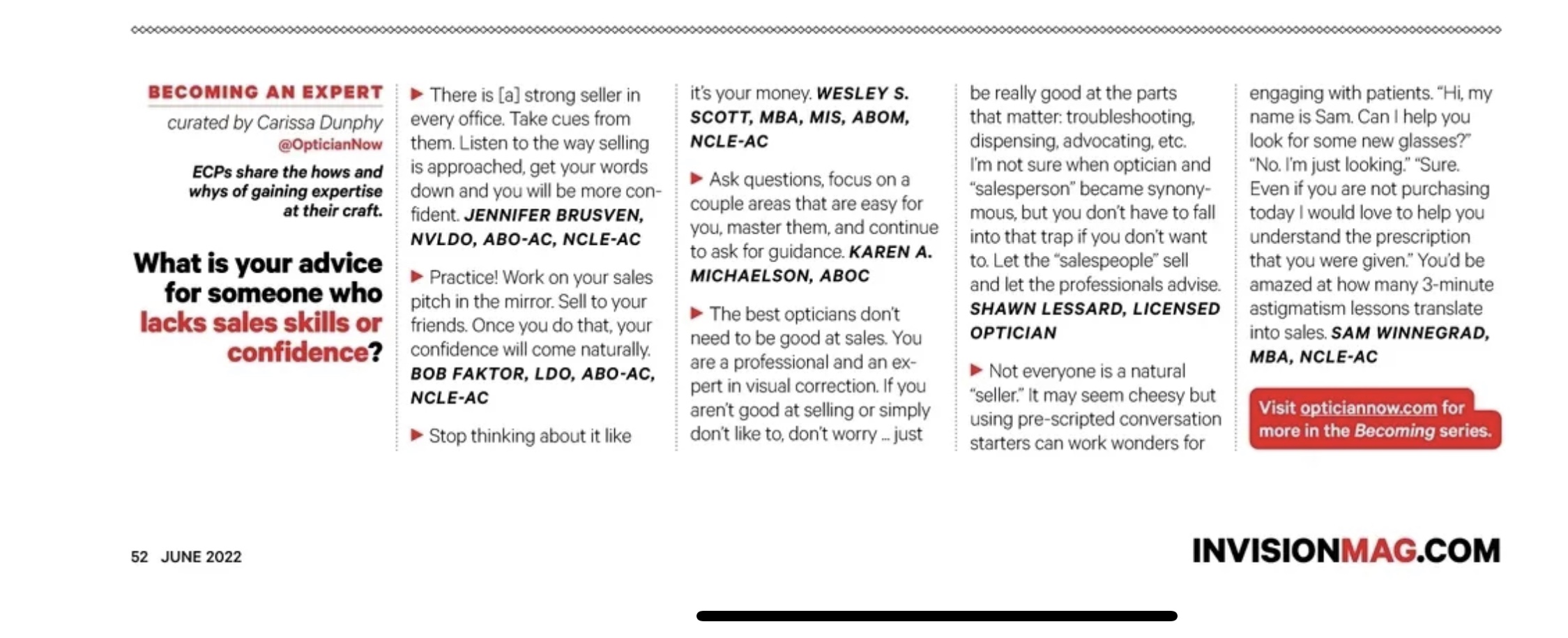 What is your advice for someone working their way to become an Optician?
What is your advice for someone working their way to become an Optician?
Learn everything you can, and don’t ever assume you know it all. Find a few mentors and learn what they have to teach you. Earn a COA accredited two-year degree, if possible. Join your state and national associations, as they can offer guidance, prep courses, and CE credits that you’ll need on your professional journey.
Why should anyone get certified/licensed?
Professionals have credentials. The best professionals have the best credentials. There’s plenty of people out there afraid of failing a test saying things like “I don’t need a piece of paper…” YES YOU DO! If you want to be taken seriously, yes you do.
In your experience, what is the best way to prepare for an Opticianry test?
It depends on what path you’re taking. If you’re going through a two year program, master the coursework, and the exams will be a cakewalk. If you’re apprenticing, buy some quality study materials, like System for Ophthalmic Dispensing, Optical Formulas Tutorial, etc. You read that right; buy your own materials. Don’t go asking for others’ leftovers. Invest in yourself. It’ll help you take yourself more seriously. I currently have over 40 books in my optician’s library.
What do you remember as being a prominent part of the test or that you were surprised to see on the test?
If you’re already working as an optician, you’ll find that the exams cover things you usually do on a daily basis. I remember one question that threw me for a loop was something about which lenses to use for a piano. I don’t know anything about piano playing. Where does the sheet music sit? Dunno. How far away is it? Dunno. It didn’t seem like a fair question, because in real life, I’d be able to get that information from the patient.

How do you decide if an additional credential should be earned?
Is this credential respected in the industry? What will the credential say about me? Am I worthy of it? What doors may it open for me? For instance, I could probably earn the NCLEM, but I wouldn’t feel worthy of calling myself a master of contact lens fitting because I’ve never fit a contact lens on an eye in my life, not even my own. It would ring hollow. However, I do feel like I embody what it is to be an ABO Master, and so I earned it and use the title proudly.
What was the point when you decided to attain your license/certification?
I got my start in the optical industry as an Army lab tech in 1993. After I left the Army in 2005, I decided to branch out and start dispensing part-time. I looked into the requirements for licensure in SC, and realized there was more than just the basic optician’s certification. When I saw there was a Master designation, I decided right then and there that someday, I’d claim that title as my own. It took about two and a half years from start to finish. I first became ABO Certified in Nov. 2007, licensed in SC in Jan. 2008, NCLE Certified in Jun. 2008, ABO Advanced Certified in Nov. 2008, NCLE Advanced Certified in Nov. 2009, and was designated an ABO Master in Feb. 2010. For a while, I was considering a move to the Savannah GA area, and so became licensed in GA in 2019.
What do you feel is your strongest skill as an Optician?
I’m pretty well versed in every aspect of Opticianry from dispensing to lab to software, etc. If I had to pick one, I’d say it’s my in-depth knowledge of ophthalmic optics.
What role have you held that best helped you to be the Optician you are today?
I was once the Director of Installation, Testing, & Support for an LMS company. That helped me gain a deeper understanding of ophthalmic optics, learn more about how digital designs work, what equipment is on the market, and who’s who in the industry. Because of that role, I began going to Expos and traveling the world, meeting opticians and lab techs from diverse backgrounds and experiences. It helped me become much better rounded.
What is your advice to someone who lacks sales skills or confidence?
Stop thinking about it like it’s your money. You have no idea what someone else’s budget is. Show them the best options first and let them guide you from there. If you need to develop sales skills, there are plenty of books you can read and courses you can take, and it’s always a good idea to find a strong mentor. From a pure customer service aspect, Ritz-Carlton has some great seminars that can be applied to any industry. Confidence will come with the skill.
If you are no longer an Optician in the traditional sense on a daily basis, how did your Optician skills help you with what you’re doing now?
I still work in the industry in multiple roles. I’m currently the director of the Fort Jackson military optical lab, where we fabricate roughly 130K pair per year, or roughly 550 per day. I also fill in part time a few days a month at a local Costco to keep my foot in the dispensing side. I have no doubt that becoming a Master in Ophthalmic Optics and spending several years dispensing to the public has greatly increased my value as a lab director. I have a better understanding of how to make quality lenses, and I know from experience what is tolerable to most patients. ANSI is there for a reason, but it’s not everything.
Never forget this is your profession, and if you’re passionate about it, no one will look out for it as fiercely as you will. Get involved with your state association or society. Offer to help out at events. Become an area representative, or join their board. If you live in a licensing state, find out what’s required to get a seat on the state board that regulates opticianry. For instance, in South Carolina, those who wish to be on the board submit a petition with the endorsement signatures of ten SC licensed opticians, and then all of our licensed opticians are sent ballots to vote for their board candidate of choice. Become an OAA member, and get involved. I recently attended the OAA Leadership meeting in Orlando, and I have to tell you, you won’t find a better group of selfless people anywhere in the industry.
Responses in this interview provided by Wesley S. Scott, MBA, MIS, ABOM, NCLE-AC. Licensed Optician, SC & GA. SCAO Vice President
Find Wesley online here:
Authored Article on The Optical Journal: Where is Opticianry Headed? The Case For Licensure
Optical Training and Licensing With Wesley Scott – Optical Journal Podcast

 What is your advice for someone working their way to become an Optician?
What is your advice for someone working their way to become an Optician?
1 thought on “Becoming An Optician: Wesley S. Scott, MBA, MIS, ABOM, NCLE-AC”
For people developing sales skills.I would recommend diving into product knowledge, get really knowledgeable about your lens, your frames, what’s would be best for each face shape and Rx type etc….then focus on educating your clients. That color is good for your skin tone, this shape is best for your face, this is the best size for you…..and why.
Soon you will be the leader in sales .
Good selling.